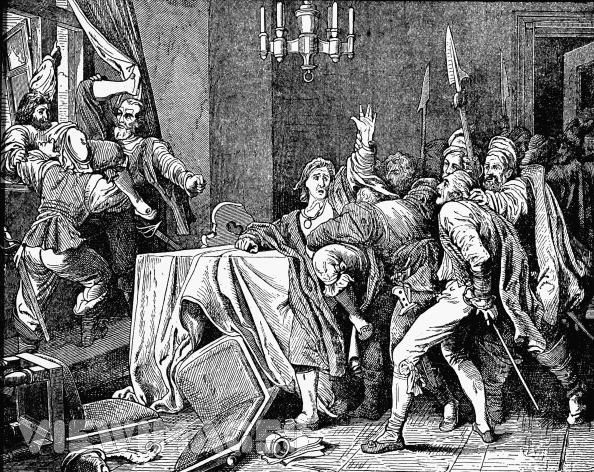
I have just finished reading a REALLY good book which I would highly recommend to anyone (both Czech and English translations are available). It’s called ‘Czechs and Balances – a Nation’s survival kit‘, written by Benjamin Kuras, a Czech-born British author and journalist. The book depicts a historical overview of the Czech lands, from the very beginning up until 20 years after the Velvet Revolution. Although I have had a Czech history lessons at school for years no one really managed to connect all of the historical events until now. And on top of that Kuras manages to do it with humor too!
I contacted him to see if it was OK for me to summarize some of his great points and he agreed to it (thank you again, Mr. Kuras!). The main part of the book is titled “Events that made Czechs who they are now”. Here is the summary of an event numero uno:
1. PRAGUE DEFENESTRATION (a very unique Czech way how to deal with political differences:))
Prague defenestration in 1419 is the beginning of Hussite Wars. During the same year the Czech king Vaclav VI. names new Prague town-hall aldermen who happen to be very Hussite-unfriendly (Catholic). These officials start to create new anti-Hussite rules which are not to the people’s likings. That is why one day a hoard of angry Czechs led by Jan Zelivsky burst into the Prague town hall and simply throw all of the aldermen out of the window (and the public finishes them off once they hit the ground). Prague people then end up electing new councils who sympathize with Hussites and the Czech king is forced to ignore the whole incident. While Vaclav lies on his death bed, Hussites raid churches and drive out all of their catholic priests.
When Vaclav dies the country finds itself without a king and Hussites take advantage it: they mobilize other Protestant towns and overtake many other Czech towns which are still Catholic.
Only 8 months after the defenestration the Pope calls the Czech kingdom the land of heretics and sends a bunch of crusaders to annihilate it. The leader of those crusades happens to be king Zikmund, Vaclav’s younger brother. The Hussites manage to fight off Zikmund’s army for 15 years (!!!) but in the year 1434 they give in to their exhaustion and are finally defeated.
CZ: Cetli jste uz knizku zvanou ‘Cesi na Vlasku’? Jestlize ne, tak si ji urcite sezente, protoze je vyborna. Kratky prehled historickych udalosti nasi rodne zeme nam s humorem a davkou moudrosti predstavuje spisovatel, dramatik, překladatel a publicista Benjamin Kuras.
1. Prazska defenestrace (‘unikatne cesky zbusob jak resit politicke nesvary’)
Prazska defenestrace v roce 1419 je zacatek hustskych valek. Vaclav IV. tohoto roku – pod natlakem nemeckych knizat – dosazuje na prazskou radnici protihusitske konsely, kteri nastavuji velmi tvrde protihusitske zakony a to se prazskemu lidu vubec nelibi. Proto jednoho krasneho odpoledne vtrhne na radnici horda lidi vedena kazatelem Janem Zelivskym a proste vyhodi konsely z okna a dole na chodniku je jeste dorazi. Prazane si pote voli nove konsely a kral je donucen nechat defenestraci nepotrestanou. Kral – ‘podpantoflac’ – umira, zatimco Prazane vesele prepadaji klastery, vyhaneji katolicke mnichy a husite obsazuji Vysehrad. Jelikoz je zeme bez panovnika, husite toho vyuziji, zmobilizuji protestantska mesta a zabiraji dalsi ceska mesta.
Pouze 8 mesicu po defenestraci prohlasi papez Ceske kralovstvi za kacirskou zemi a posle na ni krizackou vypravu pod vedenim krale Zikmunda, Vaclavova mladsiho bratra. Cechum se dovede krizaky odhanet po dobu celych 15 let! V roce 1434 vsak ale unavou podlehaji…
If you liked this post buy me a coffee! (Suggested:$3 a latte $8 for a pound) Thanks!




OK, I’ll give this one a try too — but I sure hope it is a lot better than the last book you promoted here.
I agree with Scott Phillips. Last one left a bad taste in my mouth.
History with humor is much easier to read!
I am looking foward to reading this book.
Hi guys, which book are we talking about here? Because I did not read Bus to Bohemia I just heard it was a good book. Was it really not good? And why?
I actually really liked Bus to Bohemia, but it wasn’t a “happy” book (and I’m not Czech – just married to one). I’ll probably check this one out, too, if it’ll help me get the history straight. I’m headed there for the first time this summer, and it would probably be nice to be able to have some context for what I’ll see.
Yes, happy ending is not in style as far as Czech movies/books go. Although this particular book was written by a British author.
Aaron, you would like this book, although it will be hard to get it here (I think there are a few copies on Amazon). Maybe you can get your Czech wife to ask her family back in Czech to send it to you..
The book was ok, but it was something personal. I dislike authors who, to me, make their point in the story be quite so central. Also he was guilty (to me only perhaps) of stereotyping Czechs. I am sure not everyone smokes or smoked dope, not every woman is looking only to get in bed, etc. Guess his style is just not to my liking, but as my grandfather used to say “to each his each”.
I’ll give this new one a shot!
Scott
I can only find a reference to this written in 1998. Is this the same book? TIA
Scott – I didn’t take it as a blanket characterization of all Czechs, just the ones he dealt with (and, most likely, the people a guy would be dealing with leading a lifestyle like his are *probably* a somewhat narrow sliver of the pie). I’d bet that the perspective of someone who was there as a graduate student would be different, as would that of someone who was there as a migrant worker, etc. All different angles on the same overall picture, but like your grandfather said… 🙂
Tanja – I’ve watched enough Czech movies to know that happy endings are NOT guaranteed (watched Vrchni, Prchni last weekend). I’ll see if Jana’s family can send me a copy of that book (in English – my Czech has a LOOOOOONG way to go).
Scott – yep, that’s it! My book is a later edition but he just has one extra page there saying that 20 year after revolution Czech people finally found their God: money (that’s the ultimate summary for you).
Here is the amazon link I found – the one five-star rating is mine :)) But once more Americans read it I am sure more stars will appear.
http://www.amazon.com/Czechs-Balances-Nations-Survival-Kit/dp/8072141368/ref=sr_1_1?ie=UTF8&qid=1302322204&sr=8-1-spell
Aaron – now imagine I ( and your wife) was ‘brainwashed’ with those tragic endings for the first 18 years of my life (well, SOME Czech fairy tales did have a happy ending) and then I come here and I am just dying how ‘cheesy’ the American movies are! But I am slowly learning that some life stories actually do end with a happy ending and not all of them are cheesy, they are simply happy and nice 🙂
In other words the formula that was burnt into my head was: happy = cheesy
Posh Parker made an interview with the Czech press:
http://www.rozhlas.cz/radiozurnal/zzz/_zprava/875621
Sorry to say i am more moravian then czech,being born in Brno, I have spent allmost 25 years in South
Africa,but now I am back in Brno for about 17years.That means I am older than any of You people so
have a nice and decent day.All the best wishes to You all.
Ivan.
Hi Ivan, you may be older but that means that you are wiser than any one of us here!
How was South Africa? Did you get homesick and that’s why you came back?
Just finished Czechs and Balances over this past weekend. An excellent brief overview of Czech history and trying to point out Czech national tendencies. The history is good and connects some dots, but I was a bit skeptical of attempts to generalize the Czech character being formed from historical events, though every stereotype I’ve ever heard has some grain of truth there, but often stereotypes are too distorted to be called the truth. It’s worth a read.
I loved the book because it was so entertaining and easy to read. And I do believe that the Czech character was formed mostly from historical events. For instance, the Battle of White Mountain in 1620: for next 300 years the Czechs were under the power of the Habsburg Empire. Many people claim that the foul Czechs sucked up to the Habsburgs in charge and the good Czechs left the country. The same thing happened during communism, many good Czechs left the country and a lot of opportunistic spineless Czechs stayed and became the part of STB (secret police service) and such. The oppression brought the worst (but also sometimes the best) in people and carried it from a generation to a generation.